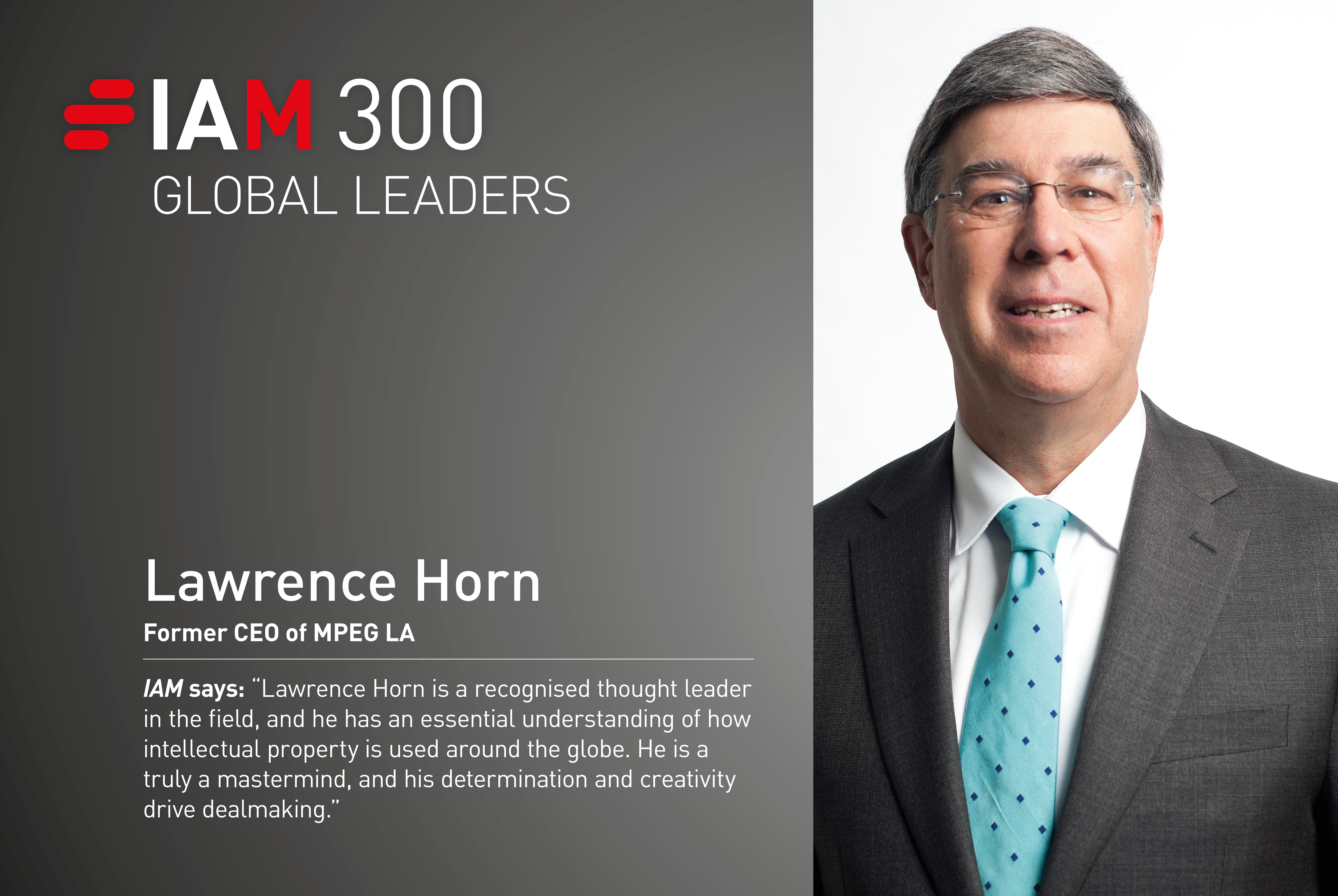Lawrence Horn

This year, Via Licensing acquired MPEG LA to form the largest patent pool in history. As the dust settles, how are you adapting to this major change and what is next for you?
It has been a big adjustment. As with any new business, I am reminded that starting my life’s next chapter relies totally on me. The good news is that I am accountable only to myself. In addition to acting as a special advisor to the merged company, I am presently focused on projects of a different kind. First is to get a biotechnology company with treatments for frontotemporal dementia and autism off the ground. Second, my personal creative writing projects: a play of historical fiction based on evolutionary science; a coming-of-age novel based on personal remembrances; the tale of a failed pre-Internet consumer electronics start-up; and storybooks for my grandchildren.
What were the key challenges you faced during this merger?
With minority ownership interests held by many companies and individuals whose investment objective was to offer the first modern day patent pool for the MPEG-2 digital video compression standard that brought ubiquity and a competitive, interoperable multi-trillion-dollar ecosystem spawning whole new industries to market, MPEG LA was not structured to be sold. The merger took 10 months to complete. One challenge was getting owners on the same page with comprehensive agreements, paving the way for MPEG LA to be merged. In addition, although there are cultural and risk-tolerance differences that must be bridged in any merger, and the acquisition of a privately owned company by an affiliate of a publicly owned company here was no exception, the shared interests of the two businesses helped to address them.
It is thought to be the first time that two pool administrators have merged into one. What are your predictions for the future of Via Licensing Alliance, and what effect will this have on pools elsewhere?
Yes, to my knowledge, this is a first. Although I never thought much about retiring,the acquisition answered many questions for me about both MPEG LA’s future as well as my own. It was the right place and the right time.I don’t think MPEG LA could have merged with anyone else.
In a market where there are fewer technologies for which patent pools offer economically viable market solutions than there are licensing administrators to operate them, Via Licensing Alliance is positioned to take the consolidated company to the next level by creating economies of scale that generate new opportunities for innovators and implementers alike.
Meanwhile, existing MPEG LA programmes will continue, and my hope is that our balanced approach to SEP licensing will live on.
What trends do you see emerging in FRAND licensing and how can companies best prepare themselves to take advantage of these?
Thanks to MPEG LA’s pioneering efforts, patent pools started with a reputation for principles, expectations, trust, balance, and fair dealing of mutual benefit to licensors and licensees. While there are new calls for regulation to propose solutions in aimless search of a problem, the response from patent pools must be to continue conducting themselves according to the practices on which MPEG LA built their reputation. Pool licences are a public trust. Adhering to the underlying principles of mass market availability and acceptance that made them successful is the way to weather whatever regulatory storm may come their way. FRAND patent pools are still a relatively new concept - their transparency, fairness, non-discriminatory quality, and most favourable royalty rates are strange to a licensing industry once shrouded in secrecy. Pools offer an alternative licence and their future availability is not assured. It will be determined by the market. If transparency and fair dealing are lost, patent pools are at risk of being lost too. The question is whether the trust that has been built will be lost to creeping assertion models masquerading as patent pools. A patent pool established to generate revenue without solving a market problem will do neither.
You told IAM in the past that you worry that the patent system is at risk of becoming obsolete, for reasons such as IP disclosure and protection systems failing to keep pace with technology. Is this still a concern today, and why?
Patents cover four-dimensional inventions using a two-dimensional lexicon. Imbalances created by patent uncertainty, limitations on accessibility favouring those who avoid licences, a growing dependence on trade secrecy in lieu of patents, and the reliability among jurisdictions of affordable enforcement systems including injunctive relief continue to cause concern.
Lawrence Horn
Former CEO of MPEG LA
[email protected]
Until its merger with Via Licensing Alliance, Lawrence Horn was president and CEO of MPEG LA, the world’s leading provider of licenses for standards. MPEG LA pioneered the modern-day patent pool, helping to produce the most widely used standards in consumer electronics history with transparent one-stop licensing solutions, and providing access to essential intellectual property, freedom to operate, reduced litigation risk and predictability. MPEG LA also worked in biotechnology, telecommunications infrastructure and electric vehicles.